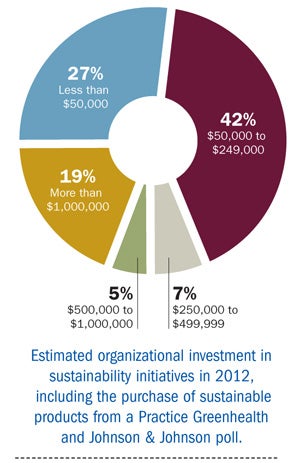Sustainability continues to make gains at hospitals

Health care facilities and systems continue to focus on ways to improve energy efficiency, reduce waste streams and boost recycling efforts as part of their daily business operations, according to two separate and recent reports.
A survey conducted by Johnson & Johnson Co., New Brunswick, N.J., and Practice Greenhealth at the recent CleanMed 2013 Conference and Exposition in Boston showed that 87 percent of responding hospitals incorporate sustainability into both the decision-making process and hospital operations when selecting environmentally preferable products and supplies.
In terms of spending, sustainability investment in the health care sector is on the upswing, with 90 percent of those surveyed stating that their hospital increased investments in sustainability in 2012 compared with the prior year.
An estimated 19 percent of respondents indicated their organizations invested more than $1 million in sustainability initiatives in 2012, including the purchase of sustainable products. Another 5 percent spent between $500,000 and $1 million dollars on sustainability, the survey showed.
What's driving these investments? Thirty-seven percent of hospital administrators cite reducing overall operational costs as their top goal.
Of the health care administrators who selected operational costs as one of their top three sustainability priorities, 37 percent named energy usage as the main concern, followed by products and supplies (28 percent), and waste disposal (22 percent). Hospitals said decreasing waste (33 percent) and creating a greener, healthier environment for patients (22 percent) are other priorities.
"Higher energy costs and patient safety are areas where I would expect most hospitals and facilities to spend their money and make their investments," says Keith Sutter, senior product director, sustainable brand marketing, Johnson & Johnson.
Elsewhere, the Healthier Hospitals Initiative (HHI), which launched in April 2011, recently released its "2012 Milestone Report" that summarizes the Initiative's first year of progress. An estimated 750 hospitals participate in the program, which offers free resources to health care facilities launching or developing sustainability programs.
Among the key achievements after one year of HHI's operation:
- Hospitals recycled more than 50 million pounds of materials, plus an additional 61.5 million pounds of construction and demolition waste.
- Hospitals saved $32.1 million by utilizing single-use medical device reprocessing.
- Organizations spent nearly $9 million on locally produced or sustainable food options.
Gary Cohen, founder of HHI, president and executive director of Health Care Without Harm and president of Practice Greenhealth, is encouraged by HHI's first-year results and expects sustainability efforts to continue to expand.
"Our sense is that hospitals start sustainability in three areas that can save a lot of money," Cohen says. "One is waste-reduction, two is energy-intensity reduction and energy-efficient strategies, and three is reprocessing medical devices. The third, especially, is going to grow in a big way."
The July 2013 issue of Health Facilities Management will present exclusive results of the 2013 Hospital Sustainability Survey, which was conducted jointly with the Association for the Healthcare Environment and the American Society for Healthcare Engineering.




